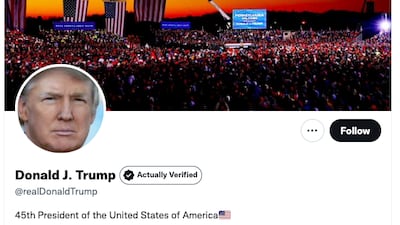For nearly 11 months, thousands of fake, automated Twitter accounts have been created to promote former US president Donald Trump.
Besides posting praise of the former president, the bogus accounts have mocked and derided Mr Trump’s critics from both the Democratic and Republican parties and launched attacks on Nikki Haley, the former South Carolina governor and UN ambassador.
Ms Haley announced last that month she was challenging her former boss for the 2024 Republican presidential nomination.
The bot accounts also suggested that Florida Governor Ron DeSantis — another Republican believed to be preparing to launch a bid — could not beat Mr Trump in the election, but would be a great running mate.
Mr Trump has been critical of Mr DeSantis in the past, calling him “Ron De-Sanctimonious”.
The cyber culprit has been using online manipulation techniques pioneered by Russia to sway the digital platform conversation about candidates while exploiting Twitter’s algorithms to maximise reach.
The sprawling bot network was uncovered by researchers at Cyabra, an Israeli tech firm that shared its findings with The Associated Press.
While the identity of those behind the network of fake accounts is unknown, Cyabra’s analysts determined that it was likely created within the US.
Bots, as they are commonly called, are fake, automated accounts that became notoriously well-known after Russia employed them in an effort to meddle in the 2016 election.
Big tech companies have improved their detection of fake accounts, but the network identified by Cyabra shows they remain a potent force in shaping online political discussion.
The new pro-Trump network is actually three different networks of Twitter accounts, all created in huge batches in April, October and November 2022. In all, researchers believe hundreds of thousands of accounts could be involved.
The accounts all feature personal photos of the alleged account holder as well as a name. Some of the accounts posted their own content, often in reply to real users, while others reposted content from real users, helping to amplify it further.
The same network of accounts shared overwhelmingly positive content about Mr Trump and contributed to an overall false picture of his support online, researchers found.
“Our understanding of what is mainstream Republican sentiment for 2024 is being manipulated by the prevalence of bots online,” the Cyabra researchers concluded.
Former president Donald Trump's Truth Social feed - in pictures
The Associated Press contributed to this report






























